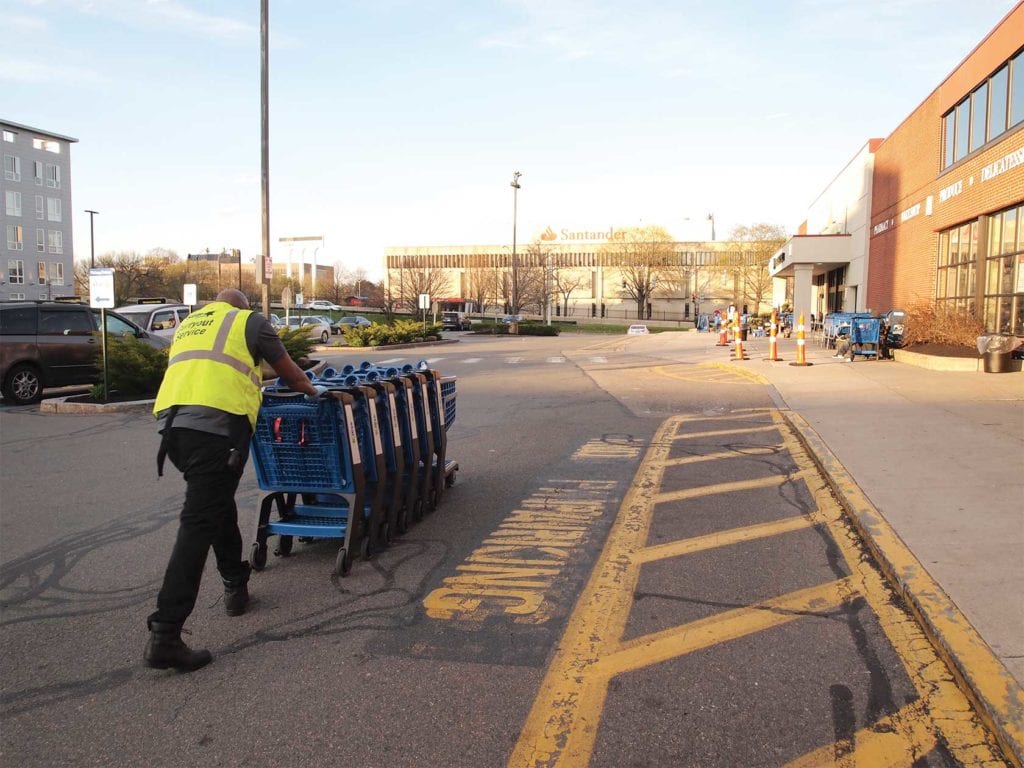Essential workers face challenging conditions
Labor activists seek protections for low-wage workers amid pandemic

The grocery store workers, airport cleaners, personal care attendants and nursing home workers deemed by state officials to be essential workers are helping keep the city safe and fed during the coronavirus pandemic.
But as many have learned over the last seven weeks under a statewide stay-at-home order, there are important distinctions between being “essential” and being valued as a worker.
“What this pandemic has elevated is the question of who is an essential worker and how they’ve been treated,” said SEIU 32BJ Vice President Roxana Rivera.
Rivera spoke as part of a livestream meeting with labor activists on May Day to honor essential workers. The challenges facing low-wage workers have come under increased scrutiny during the COVID pandemic. Some, including many of Rivera’s members, have been laid off from jobs amid the stay-at-home order. Others are continuing to work under conditions many say are dangerous.

Roxana Rivera
Banner file photo
“Thousands of our workers are essential workers,” Rivera said. “There’s a lot of anxiety. We’ve been advocating at the federal level for bailouts, we want property service workers recognized as essential workers. They need layoff protection and personal protective equipment.”
Greater Boston communities with high rates of infection, including Mattapan, Hyde Park, Chelsea and East Boston, are home to hospital and grocery store workers who brave risk of infection as they struggle to pay bills.
In April, grocery store workers staged a demonstration outside the Whole Foods in the South End to protest conditions including lack of personal protective equipment and limited sick-time pay.
For SEIU 32BJ, which represents janitors, security guards and airport workers, layoffs have already come, many with little to no advance notice. Many of those who lost their jobs lack documentation proving legal residency and cannot collect unemployment.
“It is really heartbreaking that workers who have paid taxes cannot access unemployment in these times,” Rivera said. “This pandemic has obviously highlighted what is wrong with this world. We’ve had thousands of workers laid off and hundreds who have been infected. Several have died.”
Rivera expressed hope that the current pandemic will highlight the problems facing workers who do not have union protection.
“I think that workers now are going to see how they’ve been treated in this moment and say they need to organize and make their demands bigger,” she said.
Many of the grievances workers are raising are longstanding demands that have taken on a greater urgency in the midst of the pandemic, noted Joan Edmond, a certified nursing assistant active with SEIU 1199, which represents health care workers. Edmonds said CNAs are being called to work in nursing homes due to shortages.
“We were short-staffed before the pandemic,” she said. “The level of anxiety is high. We have some CNAs who are 70 years old and they are still on the job. They are dealing with high blood pressure. They are dealing with diabetes. Management is calling them to come in despite knowing they are vulnerable. We’re dealing with a lack of empathy.”
Like other workers on the May 1 call, Edmonds said workers are struggling to obtain personal protective equipment (PPE).
“The union is working hard to make sure we have enough PPE,” she said. “We need guarantees from CEOs to make sure we have what we need. When management gives you one mask for a whole week, it’s not enough.”
Teachers face a different situation. In ordinary times, they are the front-line workers making sure students and their families receive the resources they need. As instruction has moved online, teachers are struggling even more to provide resources to students, said Boston Teachers Union organizer Natalia Cuadra-Saez, who noted teachers last year fought for fully staffed inclusion classrooms and nurses and counselors in every school.
“We’ve been thrown this curveball of COVID-19 and an economic downturn in the future,” she said. “It makes the things we’ve been fighting for that much more urgent. The gaps will be that much wider.”
In post-Katrina New Orleans, school privatization removed local control of schools from the city, she noted. As the state took control of the city’s schools, 7,500 teachers, most of whom were black women, were fired.
“They were mostly replaced by inexperienced young white teachers,” Cuadra-Saez said. “Privatizers say ‘never lose the opportunity in a crisis.’ They see crises as opportunities.”
Cuadra-Saez warned that students and teachers need to weigh in on what school will look like when the stay-at-home order is lifted, as state officials plan for the future in Massachusetts.
“If it’s not students, educators doing this kind of imagining,” she said, “it will be corporations and disaster capitalists selling us solutions we don’t need.”







